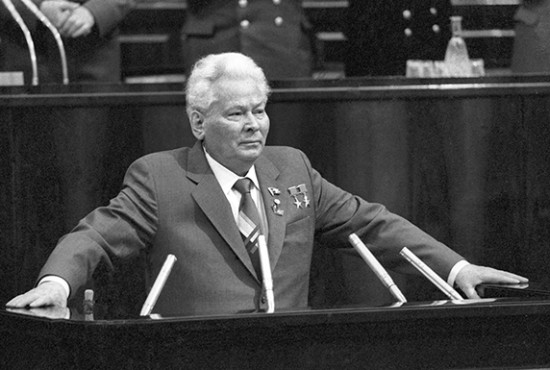Chernenko, Konstantin
Chernenko, Konstantin [Черненко, Константин; Černenko, Konstantin], b 24 September 1911 in Bolshaia Tes, Krasnoiarsk krai (Yenisei gubernia), Siberia, Russian Empire, d 10 March 1985 in Moscow, RSFSR. Soviet Communist Party official; second-to-last general secretary of the Communist Party of the Soviet Union (CPSU). His father was a Ukrainian miner, making the son Ukrainian by nationality; the mother, a native Siberian, died of typhus in 1919. Chernenko, remembered mainly as Leonid Brezhnev’s briefcase carrier, began his long and undistinguished career initially as a Komsomol official in his home province in 1929. A talented pedagogue, he specialized in propaganda and agitation. He joined the Communist Party in 1930. In the early 1930s, he served in the border detachments of the Cheka on the frontier of Kazakhstan, and in the latter half of the decade was said to have been employed in the execution of purge victims in Dnipropetrovsk. By 1941 he was secretary of the Krasnoiarsk Party oblast committee in the Soviet Far East, and in 1945 he completed the Higher School for Party Organizers of the CC VKP(b) (as the Party was then known). For the next three years he was secretary of the Penza oblast committee, training thousands of Party propagandists. From 1948 to 1956, he worked in the apparatus of the CC of the CP of the Moldavian SSR, promoting the party’s Leninist message for the first time in the Moldavian language, where he became a client of Leonid Brezhnev, the republic’s first secretary in 1950–52. During this period, he also completed by correspondence a degree in education at the Kuibyshev Teachers’ College to burnish his credentials. In 1956 he moved to Moscow to work in the propaganda apparatus of the CC CPSU, where Brezhnev had just been made a secretary. Between 1960 and 1965, he was head of the secretariat serving the Presidium of the Supreme Soviet of the USSR, concurrent with Brezhnev’s occupancy of the chairmanship of that body.
Brezhnev became first secretary of the CC CPSU in 1964 (from 1966 termed general secretary) upon the ouster of Nikita Khrushchev. In 1965 Chernenko returned to the CC CPSU apparatus as head of the general department. Renowned for his skills as a bureaucrat, there he was in charge of all of the top leadership’s personal files, including his own which he duly sanitized. He was co-opted into the CC CPSU as a candidate member in 1966, and promoted to full membership in 1971. In October 1977, he became a candidate member of the Politburo, and a full member in November 1978. He had already been a secretary of the CC CPSU since March 1976. All of these promotions were due to his patron, Leonid Brezhnev. When Brezhnev died in November 1982, he was, however, passed over for the position of general secretary by Yurii Andropov, but succeeded to it already seriously ill on 13 February 1984 on the latter’s death. Chernenko was thus the oldest individual to assume the office and its shortest tenant—one year and 25 days; his chronic emphysema from a lifetime of smoking constrained his subsequent leadership which was not only brief but marked by an absence of major departures in policy for the CPSU and USSR. Relations with China and Spain were improved. He was particularly concerned about the effect of Western rock music on younger Soviet citizens, ordered the boycott of the Los Angeles Olympic Games, spoke about the need for a re-ordering (perestroika) of the economic system, and initiated uncompleted reforms such as the school system and rehabilitation of Joseph Stalin. He did manage to reinstate in the Party Stalin’s foreign minister, Viacheslav Molotov. It was ‘Brezhnevism without Brezhnev.’ After a series of missed engagements, he died not unexpectedly of heart failure and was succeeded by Mikhail Gorbachev, for whom he thus helped pave the way. Chernenko’s career was thus at best symbolic of the prominent place Ukrainians were reputed to have held in the leadership of the CPSU and USSR, though the practical significance of this is moot. He was the last Soviet leader to be buried at the legendary Kremlin wall where a bust of him was erected.
Bohdan Harasymiw
[This article was written in 2019.]
This subject is not referenced in any other entries of the Encyclopedia of Ukraine.
